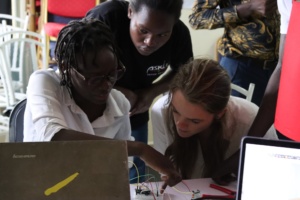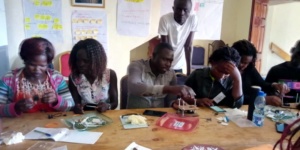This website uses cookies so that we can provide you with the best user experience possible. Cookie information is stored in your browser and performs functions such as recognising you when you return to our website and helping our team to understand which sections of the website you find most interesting and useful.
By Isabel Nuesse: WEAll Engagement and Content Lead
Open technology builds a strong case for the practicality of building a wellbeing economy. While in Nakuru, Kenya at the Digital Open Technology Summit (DOTS) conference, I saw the potential transformation that open source technology can have on local communities. Hosted by Global Innovation Gathering (GIG) and the R0g agency for Open Culture and Transformation, the gathering showcased numerous examples of localized economic development addressing specific community needs all across the global south.
A majority of my time was spent learning. Learning about the innumerable opportunities that open-source technology can provide to communities and learning about the potential disruption that this space has, as well.
There were innovations at DOTS from open-sourced orthopedic braces, to underwater gliders to microscopes. All intended to be made by local makers, to solve local problems. The hyper-localization of these projects gave me hope that a “glocalized” future is possible. Meaning, a future that using the benefits of globalization to strengthen local communities. Open-source technology has found a balance between these often-conflicting futures. I was curious to look deeper at how WEAll intersects with this work.

It was obvious that a core principal of Open-Tech mirrors that of WEAll; to value collaboration over competition. In many ways this space challenges the system by doing exactly what Buckmaster Fuller said, “You never change things by fighting the existing reality; you change things by making a better model that makes the existing models obsolete.” In the same way that WEAll is working to build a new economic system, the model that open-tech uses introduces an entirely new way of sharing information and manufacturing products.
This actualizes in the introduction of an open-source MRI machine that is being developed. The innovation would hugely benefit local communities that would otherwise, not have access to such technologies, and it necessitates transparency from large companies to disclose the true cost of a product. This is systems change.

Leaving the conference, I became curious about how WEAll can continue to interact with the open-source technology space. It addresses a complex issue of keeping communities resilient against an ever-globalized world. The weaving of these two movements seems obvious to me. So, what’s next?
If you’re interested in learning more and following some of the organizations that attended check out their twitter pages here:
- GIG, Germany: @WeareGIG
- R0G Agency, Germany: @intertwilight
- Ask Lab, Kenya: @ASKlab_Kenya
- Ataka Hub, South Sudan: @AtakaHub
- Mboa Lab, Cameroon: @labmboa
VilSqure, Nigeria: @Vilsquare - Kumasi Hive, Ghana: @KumasiHive
- Open BioEconomy Lab, UK: @OpenBioEconomy
- Go Girls ICT Lab, Juba South Sudan: @gogirlsictjuba
the discussion?
Let us know what
you would like
to write about!

